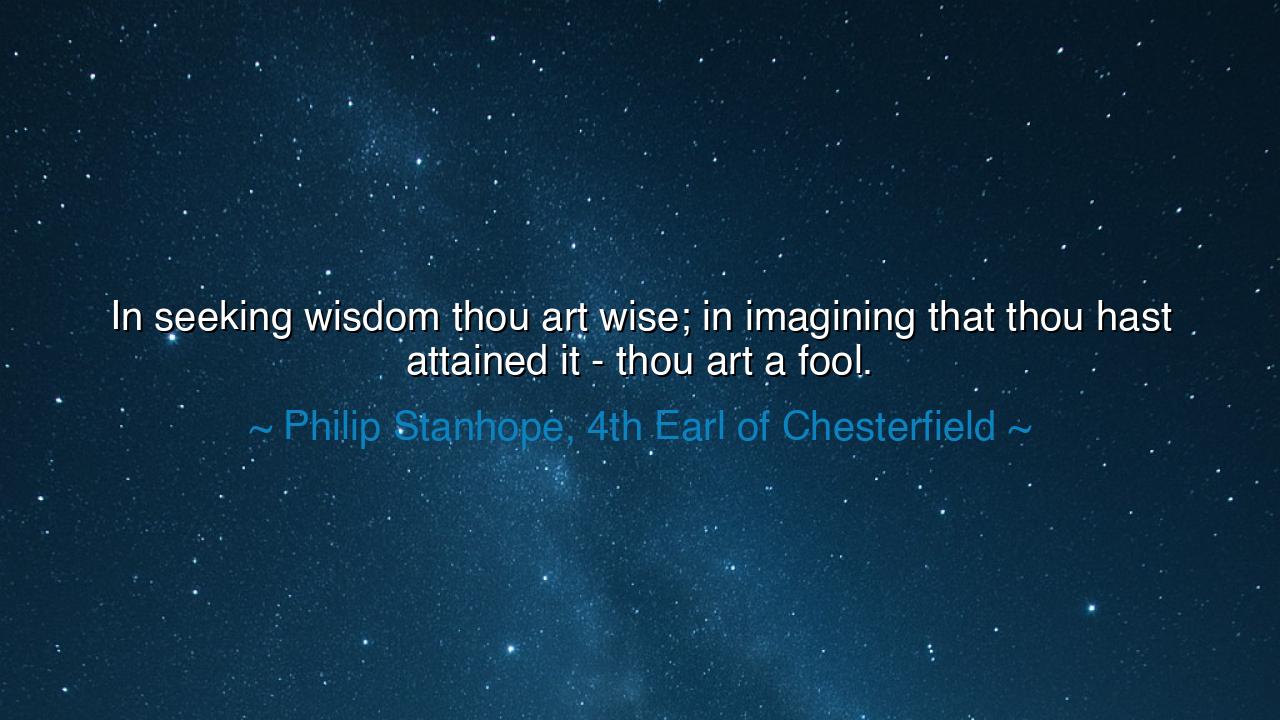
In seeking wisdom thou art wise; in imagining that thou hast
In seeking wisdom thou art wise; in imagining that thou hast attained it - thou art a fool.






The noble Philip Stanhope, 4th Earl of Chesterfield, a man of letters and refined thought, once proclaimed: “In seeking wisdom thou art wise; in imagining that thou hast attained it – thou art a fool.” These words resound like a sacred bell through the corridors of time, teaching that the path to wisdom is never-ending. To search, to question, to humbly walk the road of learning—this is the mark of a true sage. But the moment one believes they have fully attained wisdom, they fall into blindness and arrogance, becoming the very opposite of what they sought to be.
Seeking wisdom requires humility. It is the acknowledgment that the universe is vast and mysterious, and that no mortal mind can grasp all its truths. The wise are not those who claim to know everything, but those who recognize how much remains unknown. In contrast, the one who imagines they have reached the summit of knowledge closes their mind and heart, ceasing to grow. Their certainty becomes a cage, and their pride turns them into a fool, for they mistake illusion for enlightenment.
History provides a shining example in the figure of Socrates, the philosopher of Athens. When asked why he was considered the wisest of men, Socrates replied that it was because he knew that he knew nothing. His entire life was devoted to questioning, seeking, and uncovering deeper truths. Though condemned by those who feared his inquiries, his legacy endures as the embodiment of Chesterfield’s words: the eternal search for wisdom is itself the essence of true wisdom.
By contrast, consider the fall of Napoleon Bonaparte. At the height of his reign, he imagined himself a master of destiny, believing his strategies and intellect unmatched. His overconfidence blinded him to the limits of his power, leading to catastrophic decisions, such as the ill-fated invasion of Russia. In believing he had attained perfect knowledge and control, he sowed the seeds of his own ruin. His story stands as a cautionary tale of how pride turns greatness into folly.
Let this teaching be carried forward through the generations: never cease to be a seeker. Approach every moment as a student of life, knowing that even the simplest truth holds infinite depths. Guard against the temptation to believe that you have “arrived,” for that is the first step toward ignorance. As Chesterfield wisely teaches, the journey of wisdom is endless, and its true glory lies not in possession, but in the humble and tireless pursuit of understanding. In seeking, you rise; in claiming mastery, you fall.






AAdministratorAdministrator
Welcome, honored guests. Please leave a comment, we will respond soon